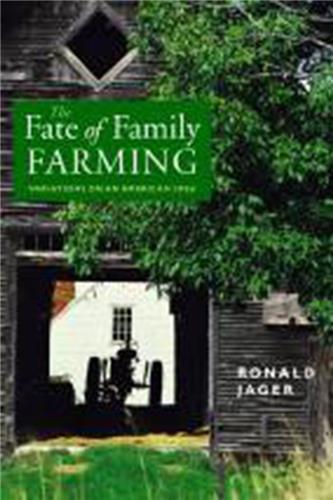This is an ambitious work with a moral imperative . . . Jager is efficient and entertaining while giving us the context for the news . . . The Fate of Family Farming is sweetly moving; you really do end up understanding why it matters.
The Fate of Family Farming employs a hands-on approach, with much local New England detail, in its exploration of the history and future of American family farming as an idea and as an ongoing way of life. Early chapters situate family farming within American history, beginning with Jamestown and Plymouth, continuing with Jefferson and Emerson and others, and including the technological transformations during the twentieth century. An extended chapter deals with the idea of “agrarianism,” and considers in detail the work of Louis Bromfield, Victor Hanson, and Wendell Berry. The middle section of the book opens a window on present-day farming with detailed portraits of four farms devoted, respectively, to the production of maple syrup, eggs and corn, milk, and apples. The author takes the reader to the barns and fields of these farms, introduces the farm families, helps the reader taste the syrup and corn and smell the silage and—ultimately enables others to see the economic and ecological challenges that farmers today face, and to consider their strategies for survival. In the last portion of the book the author provides a very accessible examination of the role of farm technology and global economics, including the many ironies of farming “success,” followed by a chapter that balances the threat and promise of biotechnology, and a concluding analysis of the current struggle for “the soul of agriculture.”


This is an ambitious work with a moral imperative . . . Jager is efficient and entertaining while giving us the context for the news . . . The Fate of Family Farming is sweetly moving; you really do end up understanding why it matters.
Jager's readable study provides an excellent background for anyone concerned about the future of agriculture and food in this country. Recommended for both public and academic libraries.
The Fate of Family Farming lives up to its title by offering not only an in-depth portrait of the American farm today but also well-reasoned projections from the American farm of the future, for good or for ill. Very highly recommended reading for anyone concerned with the seeming demise of the American family farm in the face of the global phenomena of agribusiness.
[A] lively and readable book that includes insights into classical mythology, contemporary agrarian literature, case studies of "niche farming," and a penetrating analysis of agribusiness that will deeply disturb the reader, even if there are some hopeful signs of change . . . It would be hard to find anything comparable to his small volume even in an edited anthology on farming.
RONALD JAGER, formerly a professor of Philosophy at Yale University, grew up on a family farm in Michigan. He has written books on philosophy and history and numerous informal essays, and he is the author of the well-known Eighty Acres (1990) and Last House on the Road (1994). He lives with his wife in Washington, New Hampshire.

Founded in 1971, Brandeis University Press is a nonprofit publisher dedicated to publishing innovative, high-quality books for a general audience, as well as scholarship that advances knowledge and promotes dialogue in the humanities, arts, and social sciences around the world.
© Copyright 2024, Brandeis University Press
Brandeis University Press
Goldfarb Library 69-235, MS 046
Brandeis University
415 South Street
Waltham, MA 02453
(781) 736-4547
pressinfo@brandeis.edu

Stay up to date with the newest titles and promotions from Brandeis University Press—while saving 20% on your first purchase.